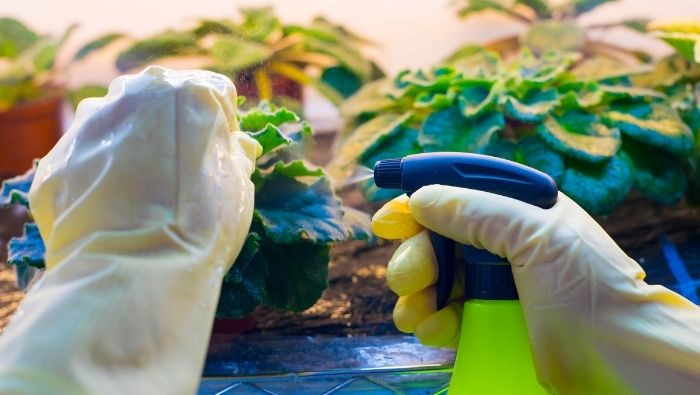8 Easy Ways To Combat Garden Pests
Keep pesky insects and animals away from your home garden with these natural and easy methods to combat garden pests.
by Jessica Dysart

1. Neem Oil
Neem oil, which comes from the seeds of the neem tree, is an organic pesticide that can be used in the garden, according to Fine Gardening. It is non-toxic to humans, animals, and even beneficial garden insects. It’s also safe to use on fruits and vegetables, making it a great choice for the organic gardener.
Neem oil is useful against harmful pests like aphids, mealybugs, cabbage worms, flies, termites, and more.
2. Baby Powder
Deter raccoons, opossums, and other animals from eating your precious veggies (that happen to be some of their favorite foods) like corn and melons with a dusting of baby powder. Raccoons and opossums aren’t a fan of the feeling of baby powder “dust” on their paws, according to Colonial Pest Control, Inc.
This can also be used on your trash cans to keep critters away.
3. DIY Insecticidal Spray
Forget splurging for expensive remedies for garden pests; you can make your own insecticidal soap spray. These horticultural soaps are non-toxic and simple to make and use.
Mix one cup of cooking oil with one tablespoon of dish soap (avoid those that contain bleach). Then add two teaspoons of the soap mixture to a cup of warm water, according to GardeningKnowHow.com. The spray is effective against a variety of insects and fungi. Be sure to test a few leaves first before covering your plants and do not use the spray when the sun is shining directly on your garden, as this will lead to burnt plants.
4. Nematodes
These tiny worms live in the soil and can help keep your garden insect-free. While some types of nematodes attack plants, the kind you can buy from reputable garden suppliers are the beneficial types that eat bacteria and insects.
The microscopic worms are effective against root weevils, cutworms, fleas, ants, termites, grubs, and more, according to the University of California Master Gardener Program of Santa Clara County.
You deserve a comfortable retirement.
5. Other Plants
Let the plants in your garden repel insects and animals for you.
Certain herbs planted in or near your garden will “emit chemicals into the air and/or soil that repel bugs and small rodents,” according to Stephanie L. Tourles, author of Naturally Bug-Free: 75 Non-Toxic Recipes for Repelling Mosquitoes, Ticks, Fleas, Ants, Moths, & Other Pesky Insects.
Helpful herbs include anise, basil, garlic, mint, rosemary, sage, and thyme.
6. Cayenne Pepper
A sprinkling of cayenne pepper around your garden will keep a variety of pests and animals away. The spicy flavor will deter deer, rabbits, raccoons, beetles, and other bugs.
A study from Auburn University found that red pepper powder (like cayenne) was more effective at protecting cabbages than chemical pesticides.
7. Beer
Stop slugs from invading your garden with this unconventional tip. Use beer! Slugs are attracted to the fermented yeast, according to Organic Life.
Use a shallow container buried in the dirt even with the soil level and fill with beer. Kingsbury Malt Beverage was found to be the most effective at attracting slugs in a Colorado State University study, followed by Michelob and Budweiser. The slugs crawl in and drown.
8. Ladybugs and Other Beneficial Bugs
You may find all bugs icky, but quite a few species are actually helpful to have in your garden. Beneficial insects include ladybugs, lacewings, praying mantis, and predatory wasps. Ladybugs are especially effective against aphids (they can eat 50 aphids a day!).
Before turning to pesticides, try releasing ladybugs at the base of infested plants. They’ll crawl up to find the aphids.
A heavily infested rose bush required two applications of 1,500 ladybugs each to control aphids, in a study by UC Davis’s Integrated Pet Management Program.
Reviewed May 2024
Sign me up for a comfortable retirement!
Popular Articles
- Comparing Retirement Housing Options
- How We Retired With Almost No Savings
- How Retirees Can Live on a Tight Budget
- 9 Things You Need to Do Before You Retire
- What You Need to Know About Long Term Care Insurance Before You Retire
- You Didn’t Save Enough for Retirement and You’re 55+
- Could Debt Derail Your Retirement? A Checklist
- Your Emergency Fund In Retirement: A Comprehensive Guide
- Managing Your 401k In Your 50s

